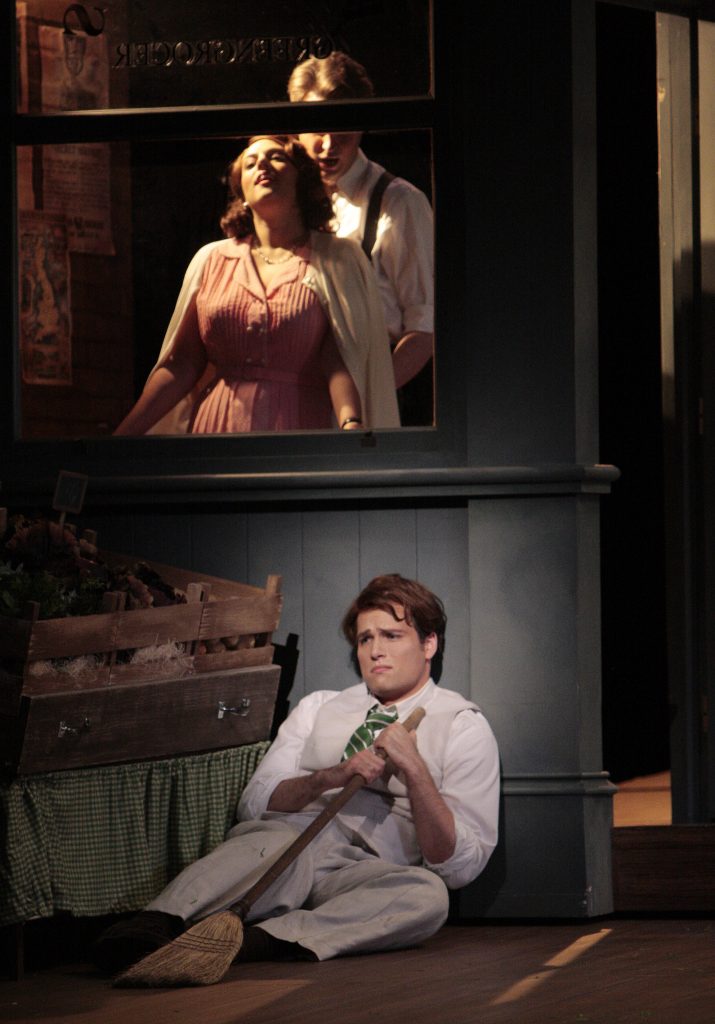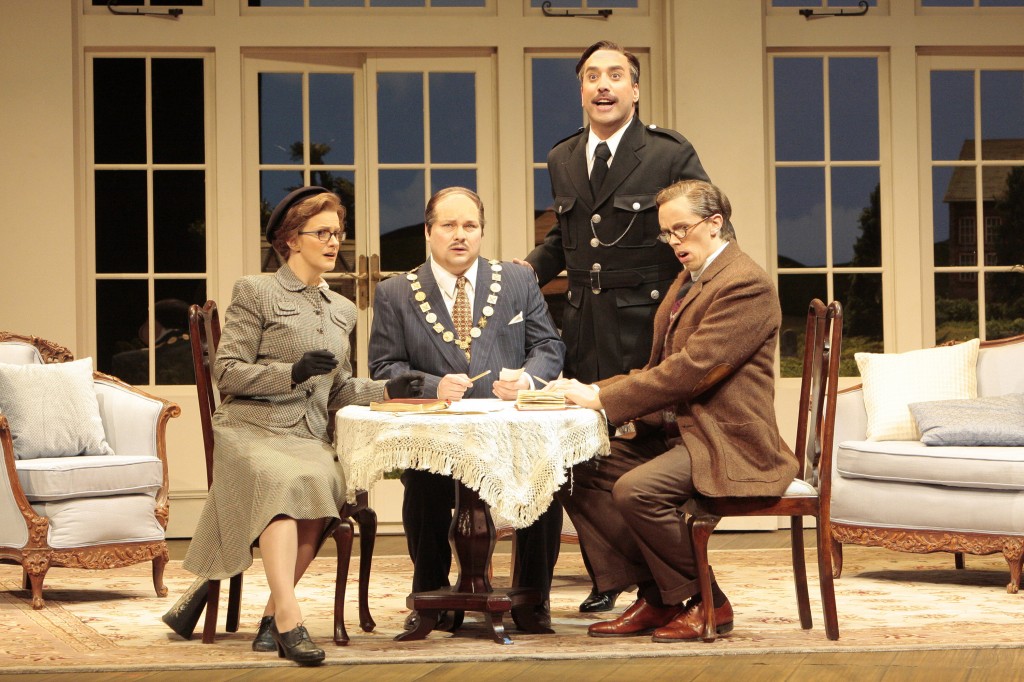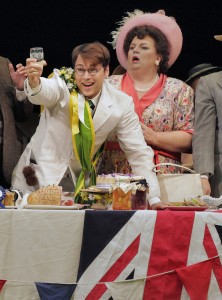Los Angeles Opera’s Delightful “Albert Herring”

Alek Shrader as Albert Herring, with Daniela Mack as Nancy and Liam Bonner as Sid. Photo by Robert Millard.
Review by David Gregson
March 6, 2012
I rather feel as if all I need to do is reword my comments about this opera and this particular production of it which I first saw in Santa Fe in 2010. The only thing that makes the remounting of this production at Los Angeles Opera less than ideal is the mildly painful reality that the Santa Fe Opera’s sets do not so neatly fit into the vaster expanses of the stage at the Dorothy Chandler Pavilion.
To quasi-plagiarize myself (in the sincerest form of semi self-flattery): Superbly conducted by James Conlon (with a select group of Los Angeles Opera players who actually took to the stage at curtain call) and benefitting from Paul Curran’s canny, clever and amusing stage direction, Benjamin Britten’s comedy, “Albert Herring”, is a charming addition to the current LAO season, albeit one that reflects some of the financial belt tightening brought about by the Achim Freyer “Ring Cycle” with incidental music by Richard Wagner. I am virtually alone among opera critics’ voices crying in the wilderness about Freyer’s memorably awful Wagnerian desecration, a kind of kinetic art installation with “The Ring” as an aural accompaniment!
LAO’s “Albert Herring” is excellent in almost every way, although I have never counted the opera among my favorite Britten works. The caricatures of small village types (stereotypes, really) have always struck me as a little cloying and self-consciously cute on the part of their creators, librettist Eric Crozier and the composer himself. I suspect today’s audiences, especially those who have been following “Downton Abbey” on PBS, find this opera’s English village and its aristocratic meddler, Lady Billows, a bit drab after experiencing a heady diet of upstairs-downstairs soap opera in which immorality and wild happenings are the rule of the day. “Herring” opera-goers were seen to be fleeing at intermission, but those who stayed loved it — or at least they seemed to.
The opera’s plot is not too complicated to explain in a few sentences: Because the unbearably priggish Lady Billows (wonderfully sung and acted by soprano Janice Kelly) cannot find an acceptably virtuous local girl to be Queen of the May in the town’s seasonal festival, she, with considerable prodding from her housekeeper (fabulous mezzo-soprano Ronnita Nicole Miller), the schoolteacher Miss Wordsworth (played to fidgety perfection by soprano Stacey Tappan), and the town vicar, the mayor and the police superintendent (all excellent and listed below), she chooses the innocent, pure and supposedly simple-minded working ox, Albert Herring, as King of the May. The aggressively heterosexual couple, Sid and Nancy (in fabulous incarnations created by baritone Liam Bonner and mezzo-soprano Daniela Mack ) help precipitate Herring’s fall from grace. Sid spikes Albert’s lemonade with rum, and before the festival day is over, Albert is on a rampage — and proud of it. Essentially he no longer gives a damn what anybody thinks, even his suffocating mother (hilariously performed by mezzo-soprano Jane Bunnell).
The work’s eponymous hero is naive virtually to the point of incredibility. It’s one thing to be a mama’s boy working as a shopkeeper in Loxford, East Suffolk (a fictional locale), and quite another to have never tasted alcohol nor, at his, age to have even attempted to try it — nor to be able to recognize it when he drinks it in a glass of lemonade. Albert also gets very drunk rather quickly. I am certain Crozier and Britten know East Suffolk better than I do, yet when I lived in a British village as a young man, my English “parents” and their children went to the local pubs together and there were drunks on every corner after “closing time”. How can one so long be shielded from such a reality?

Stacey Tappan as Miss Wordsworth; Robert McPherson as Mr. Upfold, the Mayor; Richard Bernstein as Superintendent Budd; Jonathan Michie as Mr. Gedge, the Vicar. Photo by Robert Millard
As for the role of Albert himself — it will be many years before anyone will come along as good as tenor Alex Shrader. For me, he will always be Albert Herring. Not only does he sing gorgeously, he brings the part a distinct and palpable masculine attractiveness that makes the character all the more interesting. Underneath the nerdy exterior, we know there is a real man waiting to be unleashed. Certainly one did not feel this so strongly with Peter Pears!
I tend to see Herring as a metaphor for Britten’s experience with homosexuality in the UK. At one time to engage in homosexual acts was actually illegal and there was considerable intolerance in society at large. On some level Herring’s ultimate liberation is symbolic of a coming out of the closet. Many of Britten’s works appear to be encoded with messages about his personal feelings of oppression and marginalization as a gay man, although to assert this is to be guilty of the “biographical fallacy” most critics of my generation usually reject. Surely “Albert Herring” — and “Peter Grimes,” for that matter — can be appreciated without reference to Britten’s private life.
On a personal note, I have to mention that Albert’s final liberating gesture — the throwing his King of the May boater hat into the audience — directly affected my seat companion at whose feet the Frisbee-like, tattered and prop-worn hat, landed with a plop. Sadly, she had to surrender it to a backstage prop man upon our exiting the row — and she was awarded with a T shirt as a consolation prize. “I caught Albert Herring’s hat and all I got is this damned T-shirt,” is essentially the amusing sentiment posted on her site.
Finally — while “Albert Herring” is not an opera I love to distraction, I greatly admire the skill and inventiveness of the overall composition. Britten explores all sorts of musical forms in marvelously complex and often very humorous numbers and ensembles, and while the piece is not especially moving (it is a comedy, after all), it is deftly accomplished and witty throughout. I would absolutely recommend this excellent production, and although Janis Kelly is excellent as Lady Billows, Christine Brewer fans should note that she takes over the part on March 14.

Alek Shrader as Albert Herring and Christine Brewer as Lady Billows. Photo by Ken Howard from Santa Fe Opera.
CAST
Albert Herring: Alek Shrader*
Lady Billows (Feb 25 – Mar 11): Janis Kelly*
Lady Billows (Mar 14 – 17): Christine Brewer*
Nancy: Daniela Mack*
Florence Pike: Ronnita Nicole Miller++
Miss Wordsworth: Stacey Tappan
Mr. Gedge, the Vicar: Jonathan Michie*
Mr. Upfold, the Mayor: Robert McPherson*
Superintendent Budd: Richard Bernstein
Mrs. Herring: Jane Bunnell*
Sid: Liam Bonner*
Emmie: Erin Sanzero*
Cis: Jamie-Rose Guarrine*
Harry: Caleb Glickman
CREATIVE TEAM
Conductor: James Conlon
Director: Paul Curran*
Scenic and Costume Designer: Kevin Knight*
Lighting Designer: Rick Fisher*
Assoc. Conductor: Grant Gershon
* LA Opera debut artist
+ Domingo-Thornton Young Artist Program member
++ Domingo-Thornton Young Artist Program alumnus

Thank you for your great review which Albert absolutely deserved.
On a more unpleasant note……. I too thought that our Ring was a total failure as a visual production. I enjoyed the aural production and often simply closed my eyes to eliminate the dreadful sights on stage……costumes, “swords”, masks, the artists struggling to remain upright……the whole sorry lot.